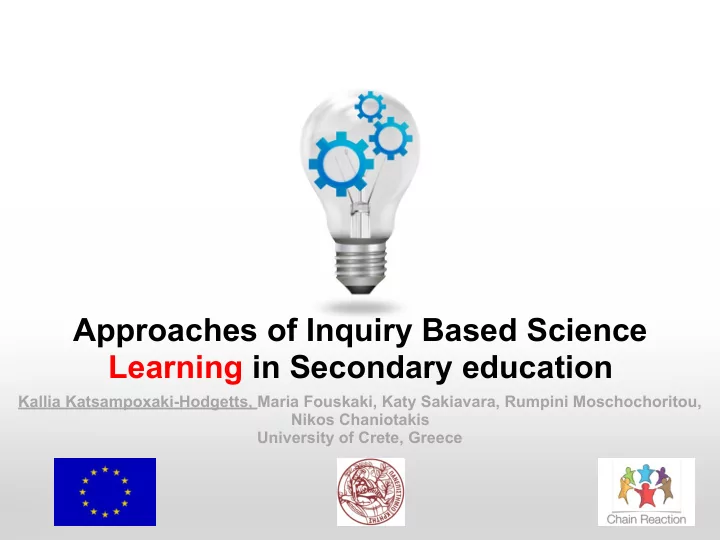

Approaches of Inquiry Based Science Learning in Secondary education Kallia Katsampoxaki-Hodgetts, Maria Fouskaki, Katy Sakiavara, Rumpini Moschochoritou, Nikos Chaniotakis University of Crete, Greece
Excitement & challenges of a scientist • Ask a question • Form a hypothesis • Conduct an experiment • Collect data • Draw conclusions • Disseminate findings
Science is not a recipe in a cookbook
Students’ ownership and ‘Inquiry’ curricula Learn by being active researchers Generate their own research questions Conduct their own investigations Generate their own conclusions Communicate their own findings with peers
Chain Reaction Inquiry curricula • Real-life culturally-tailored contexts and tasks Hands-on approach • Appeal to both genders • Development diverse skills: - exploratory problem solving - team working - organisational investigative competencies
What’s exciting about that?
Get them involved
Inquiry in a collaborative environment
Now the experimental Setup makes sense!
International Award
Purpose of study To reflect critically upon project implementation with regards to: Aims Interest Usability Stages of scientific inquiry Nature of science (NoS) Scientist profile
Participants • Secondary education students (n=150) aged 14-16, in five schools • Science teachers (n=10) • Chain Reaction teacher educators (n=2) • UoC Project Management Board (n=2)
Teachers’ previous experience on IBSE
EUPRB’s
How students evaluated the project
EUPRB modifications
Student responses on whether they would pursue the career of a scientist
Three scientist traits
Shape describing your research path
Shape describing research path
Was your teacher the sole source of information?
To what extent student ideas or suggestions were used in class?
Students rating their own contribution in the research activities of their team
Students enjoyed working in a team
Teacher & Student interviews 1. Better experimental equipment in school laboratories 2. More training in • using blogs , Skype or asynchronous platforms • selecting reliable references • paraphrasing and plagiarism • statistics & graph designing software i.e. Excel • powerpoint presentations ( tool and skills) • writing and designing a scientific poster
Inquiry: a sustainable framework More meaningful Informal Flexible Peer-reviewed Collaborative Student-driven
Inquiry Based Science Education (IBSE) curricula http://www.chreact.eu/
References [1] National Research Council. National science education standards. Washington: National Academy Press; 1996. [2] National Research Council. A Framework for K-12 Science Education: Practices, Crosscutting Concepts, and Core Ideas. Committee on a Conceptual Framework for New K - 12 Science Education Standards. Board on Science Education, Division of Behavioral and Social Sciences and Education.Washington, DC: The National Academies Press; 2012 [3] Saltiel E. Inquiry-Based Science Education: Applying it in the Classroom. Methodological Guide; 2005. [4] Capps K, Crawford BA. Inquiry-based instruction and teaching about nature of science: Are they happening? Journal of Science Teacher Education. Springer; 2012. Published online 26.08.12. [5] Anderson R. Inquiry as an organizing theme for science curricula. In: S. Abell & N. Lederman (Eds.), Handbook of research on science education (pp. 807–830). Mahwah, NJ: Lawrence Erlbaum Associates; 2007. [6] Bodzin AM, Beerer KM. Promoting inquiry-based science instruction: The validation of the Ccience Teacher Inquiry Rubric (STIR) Journal of Elementary Science Education 2003; 15 (2): 39-49. [7] Crawford, BA. Embracing the essence of inquiry: New roles for science teachers Journal of Research in Science Teaching; 2000; 37: 916–937. [8] Tali T, Geier R, Krajcik J. Urban students’ beliefs about science in an inquiry-based classrooms Paper presented at AERA conference New Orleans; 2000. [9] Hayes, MT. Elementary Pre-service Teachers' Struggles to Define Inquiry-Based Science Teaching. Journal of Science Teacher Education 2002; 13 (2): 147-165. [10] Jeanpierre B, Oberhauser K, Freeman C. Characteristics of Professional Development That Effect Change in Secondary Science Teachers’ Classroom Practices Journal of Research in Science Teaching 2005; 42: 668-690. [11] Keys CW, Bryan LA. Co-Constructing Inquiry-Based Science with Teachers: Essential Research for Lasting Reform Journal of Research in Science Teaching 2001; 38(6): 631-645. [12] Atwater, M.M. Research on curricular diversity in the Classroom. In: D.L. Gabel (Ed.), handbook of Research on Science Teaching and Learning. New York: Macmillan; 1994. [13] Levy P, Lameras P, McKinney P, Ford N. The features of inquiry learning: theory, research and practice. Pathway to Inquiry Based Science Teaching, (Deliverable 2.1). European Commission: CSA-SA Support Actions, Project Number 266624. Retrieved from http:// www.pathwayuk.org.uk/what-is-ibse.html; 2011 [14] Linn MC, Bell P, Davis EA. Internet environments for science education (pp. 315-339) in Mahwah, NJ, US: Lawrence Erlbaum Associates Publishers, xxviii, p.412; 2004. [15] Tseng C-H, Tuan H-L, Chin C-C. How to help Teachers Develop Inquiry Teaching: perspectives from experienced Science teachers Research in Science Education 2013; 43: 809-825 [16] Vygotsky LS. Mind in society, Harvard University Press Cambridge 1978. [17] Hutchings W. Enquiry-Based Learning:Definitions and Rationale 2007. [18] Loucks-Horsley S, Love N, Stiles KE, Mundry S, Hewson PW. Designing professional development for teachers of science and mathematics. Thousand Oaks, CA: Corwin Press 2003. [19] Zadeh I, Zion M. Which Type of Inquiry Project Do High School Biology Students Prefer: Open or Guided? Research in Science Education 2012; 42:831–848 [20] Maor D, Fraser BJ, Use of classroom environment perceptions in evaluating inquiry-based computer-assisted learning International Journal Science Education 1996;18(4): 401-421 [21] Crawford BA, Learning to Teach Science as Inquiry in the Rough and Tumble of Practice Journal of Research in Science Teaching 2007; 44(4): 613–642
Recommend
More recommend